Managing rental properties can be a lucrative venture, but it requires careful tracking of income and expenses.
As a real estate investor, you need efficient tools to streamline your financial management processes and maximize your returns.

Implementing the right software solutions can help you accurately monitor your rental income, automate bookkeeping tasks, and simplify tax preparation. By leveraging these tools, you’ll gain valuable insights into your property performance and make informed decisions to optimize your real estate portfolio.
Let’s explore six essential tools that can transform the way you track your rental income and manage your investments.
1) Stessa
Stessa offers powerful rental property management software designed specifically for landlords.
You can use this tool to streamline your real estate finances and optimize your rental property operations.
With Stessa, you can effortlessly track income and expenses for your rental properties.
The platform provides real-time dashboards that give you instant insights into your property performance.
You’ll find it easy to manage receipts and invoices using Stessa’s cloud storage feature.
Simply scan documents with the mobile app or forward emails directly to your Stessa account.
The software allows you to generate detailed financial reports automatically.
This feature can be particularly helpful during tax season, saving you time and reducing stress.
Stessa offers both free and premium plans to suit your needs.
The free Essentials plan provides basic functionality, while the Pro plan includes additional features for more advanced users.
You can also use Stessa to screen tenants, collect rent online, and draft leases.
These features help simplify your property management tasks and improve efficiency.
2) Realtyzam
Realtyzam is a specialized accounting software for real estate agents.
It offers a streamlined solution for tracking your rental income and expenses.
With Realtyzam, you can manage your accounting tasks in less than 10 minutes a month.
This time-saving feature allows you to focus more on growing your real estate business.
The software provides a user-friendly interface designed specifically for realtors.
You can easily input and categorize your income and expenses related to rental properties.
Realtyzam offers affordable pricing options, starting at $14 per month when billed monthly or $11.95 per month when billed annually.
A 30-day free trial is available, allowing you to test the software without financial commitment.
The platform generates instant reports tailored for your tax needs.
This feature simplifies your tax preparation process and ensures you have accurate financial records for your rental properties.
Realtyzam’s simplicity makes it an excellent choice for independent real estate agents or small teams.
You can quickly track your rental income, commissions, and various business expenses in one place.
By using Realtyzam, you can gain better insights into your real estate finances.
This knowledge can help you make informed decisions about your rental property investments and overall business strategy.
3) Rentec Direct
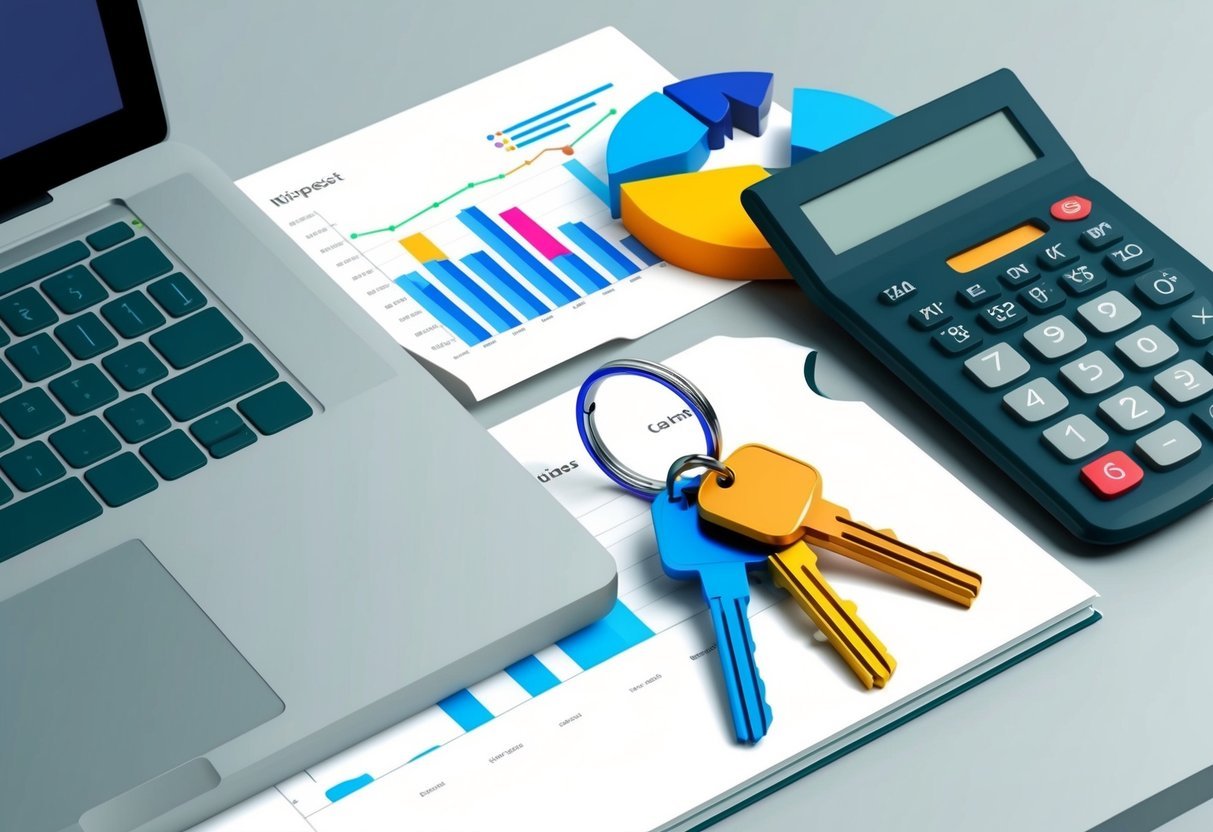
Rentec Direct offers robust property management software designed for landlords and property managers.
You’ll find it particularly useful for tracking rental income from multiple properties.
The platform provides comprehensive accounting features to help you manage your finances effectively.
You can easily record rent payments, track expenses, and generate financial reports.
Rentec Direct allows you to automate rent collection, saving you time and reducing the risk of late payments.
Tenants can pay rent online, and the system automatically updates your records.
You’ll appreciate the software’s user-friendly interface, which makes it easy to navigate and access important information quickly.
The cloud-based system ensures you can access your data from anywhere, at any time.
Rentec Direct also offers tenant screening services, lease management, and maintenance tracking.
These features help you streamline your property management tasks beyond just income tracking.
For larger portfolios, you might consider upgrading to Rentec Pro.
This version includes additional features like property marketing tools and more advanced reporting options.
By using Rentec Direct, you can efficiently manage your rental income, reduce administrative tasks, and gain valuable insights into your property performance.
4) Landlord Studio
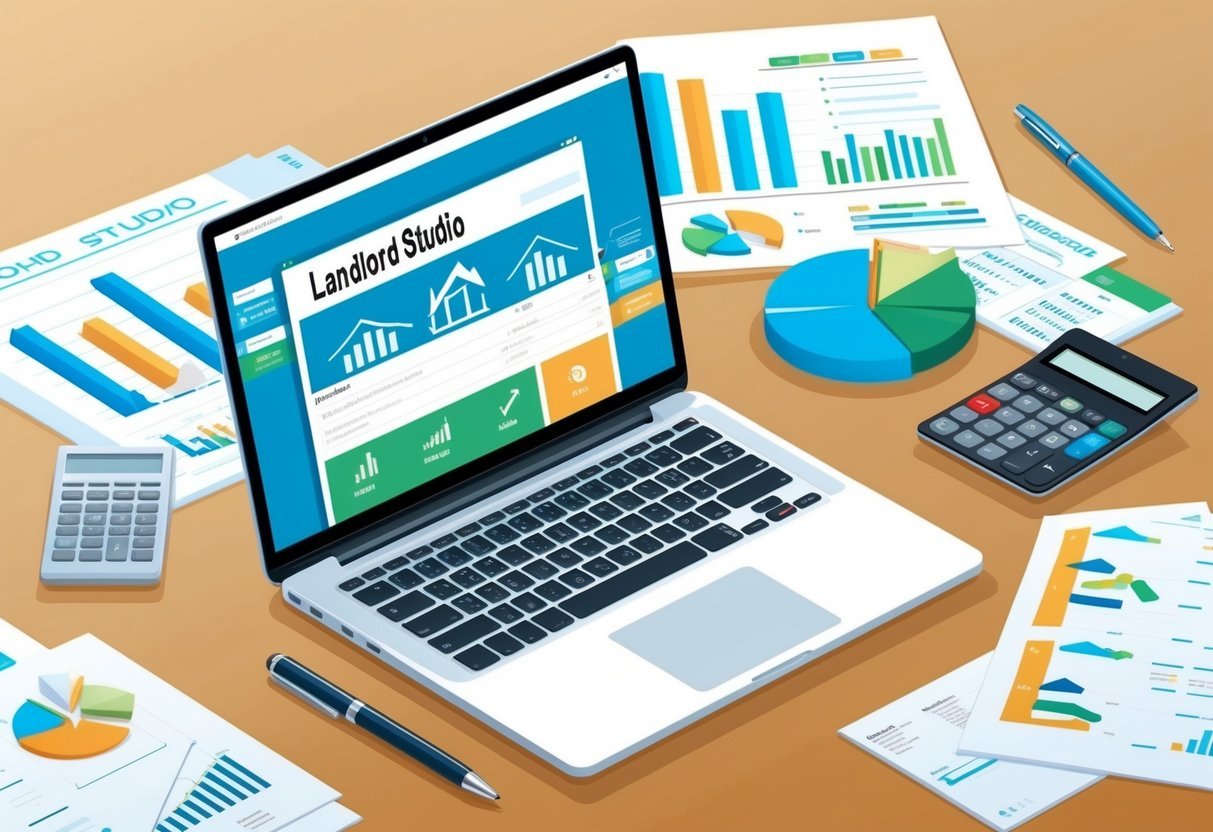
Landlord Studio offers a comprehensive solution for tracking your rental property income.
This powerful software helps you manage your entire rental portfolio efficiently.
You can easily log rent payments and keep track of all your income at unit, property, or organization levels.
The platform allows you to record payments quickly and accurately, ensuring you never miss a transaction.
Landlord Studio provides a user-friendly dashboard that gives you quick insights into your rental income.
You can generate customizable reports to analyze your portfolio finances in detail.
The software offers over 15 accountant-approved reports, including a Schedule E report specifically designed for landlords.
These reports can be customized by category, date range, and property, giving you a clear picture of your rental income.
With Landlord Studio, you can access your rental income data from anywhere.
The mobile app allows you to track expenses on the go, making it easier to manage your properties even when you’re away from your desk.
The platform also helps you understand your rental property’s profitability.
It can calculate your rental yield and mortgage repayments, assisting you in evaluating investment properties.
By consolidating all your rental management tools into one easy-to-use software, Landlord Studio helps you save time and maximize your rental profits.
5) Buildium
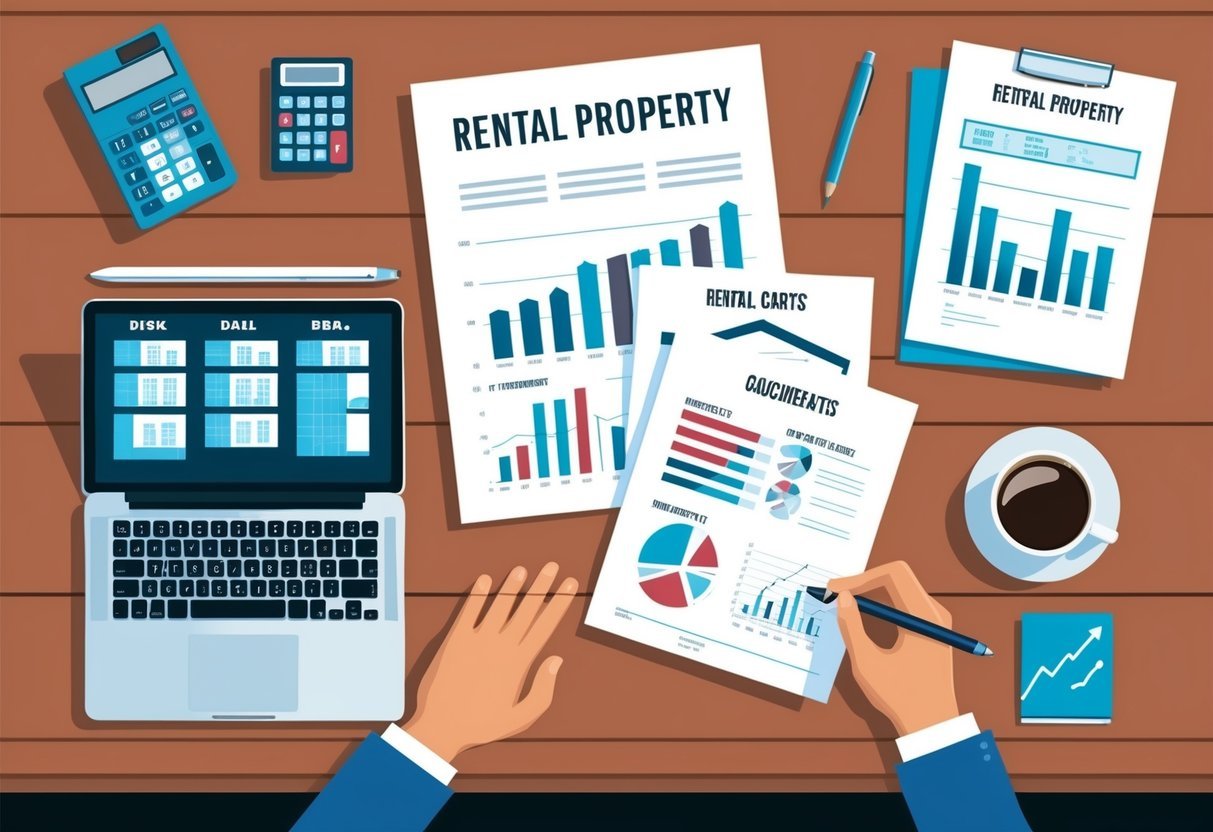
Buildium offers a comprehensive solution for tracking your rental income.
This property management software provides tools to streamline your financial processes and keep your records organized.
With Buildium, you can automate rent collection and easily monitor incoming payments.
The platform allows you to set up automatic reminders for tenants, reducing late payments and saving you time on follow-ups.
You’ll appreciate the detailed financial reporting tools that Buildium offers.
These reports give you a clear picture of your rental income, expenses, and overall financial health of your properties.
The software also includes features for creating and managing rental listings.
You can input property details, upload photos, and craft descriptions within a single platform, making it easier to market your rentals effectively.
Buildium’s Income Statement report is particularly useful for tracking rental income.
This report provides a summary of your property’s income and expenses, helping you calculate net profit or loss for any given period.
For those managing multiple properties, the Rental Owner Statement feature is invaluable.
It offers a comprehensive overview of ‘money in, money out’ for each rental owner, including asset, income, expense, liability, and equity transactions.
6) AppFolio
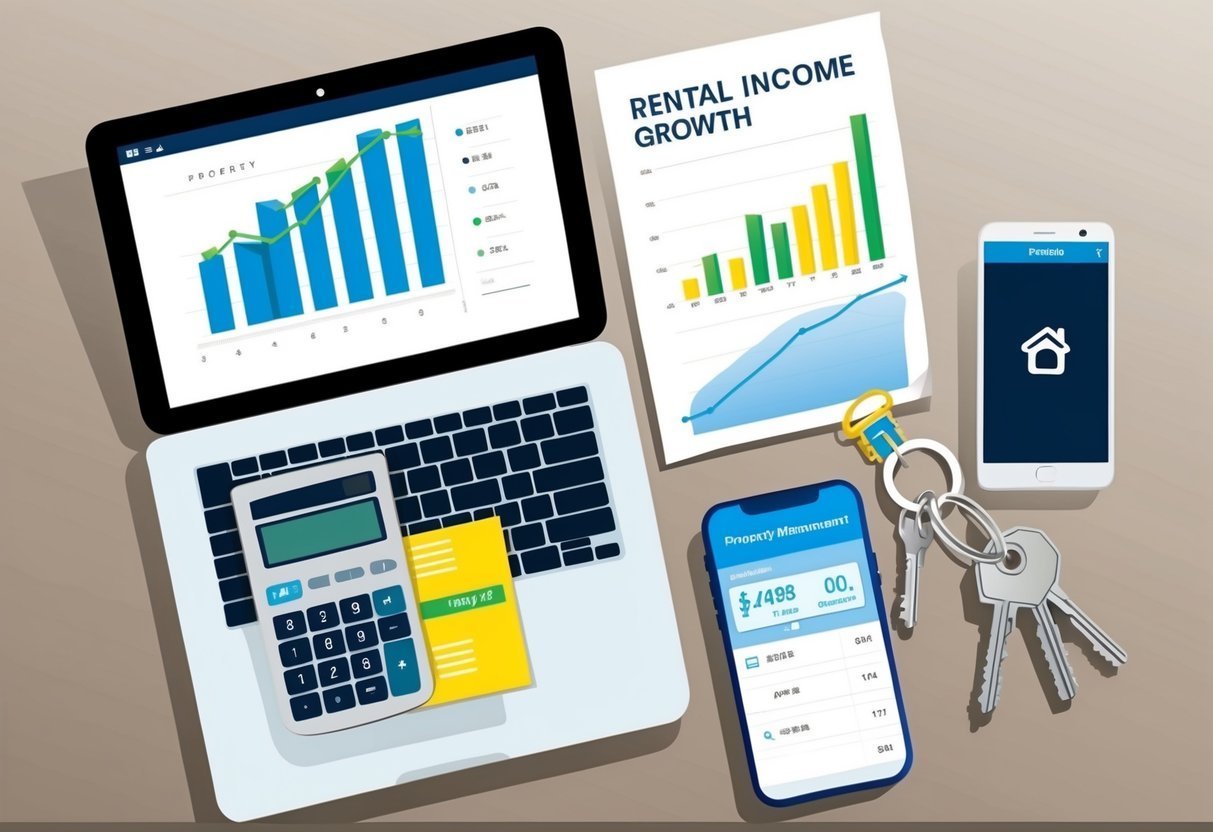
AppFolio is a comprehensive property management software that can greatly simplify your rental income tracking.
This cloud-based solution offers a wide array of features designed to streamline your accounting processes.
With AppFolio, you can automate your workflows and save time on routine tasks.
The platform allows you to process payments, generate financial reports, and manage your accounts more efficiently.
One of AppFolio’s strengths is its extensive collection of customizable reports.
You can easily access owner statements, income statements, and cash flow reports, helping you gain a clearer picture of your property’s financial performance.
The software also facilitates easy drilling down into specific items within reports.
This feature enables you to quickly identify and address any financial discrepancies or areas of concern in your rental properties.
AppFolio’s user-friendly interface makes it accessible even if you’re not particularly tech-savvy.
You’ll find that processing year-end statements and reconciling accounts becomes significantly faster and less complicated.
By leveraging AppFolio’s capabilities, you can gain a better understanding of your business performance.
This insight can help you make more informed decisions about your real estate investments and potentially boost your rental income.
Importance of Tracking Real Estate Rental Income
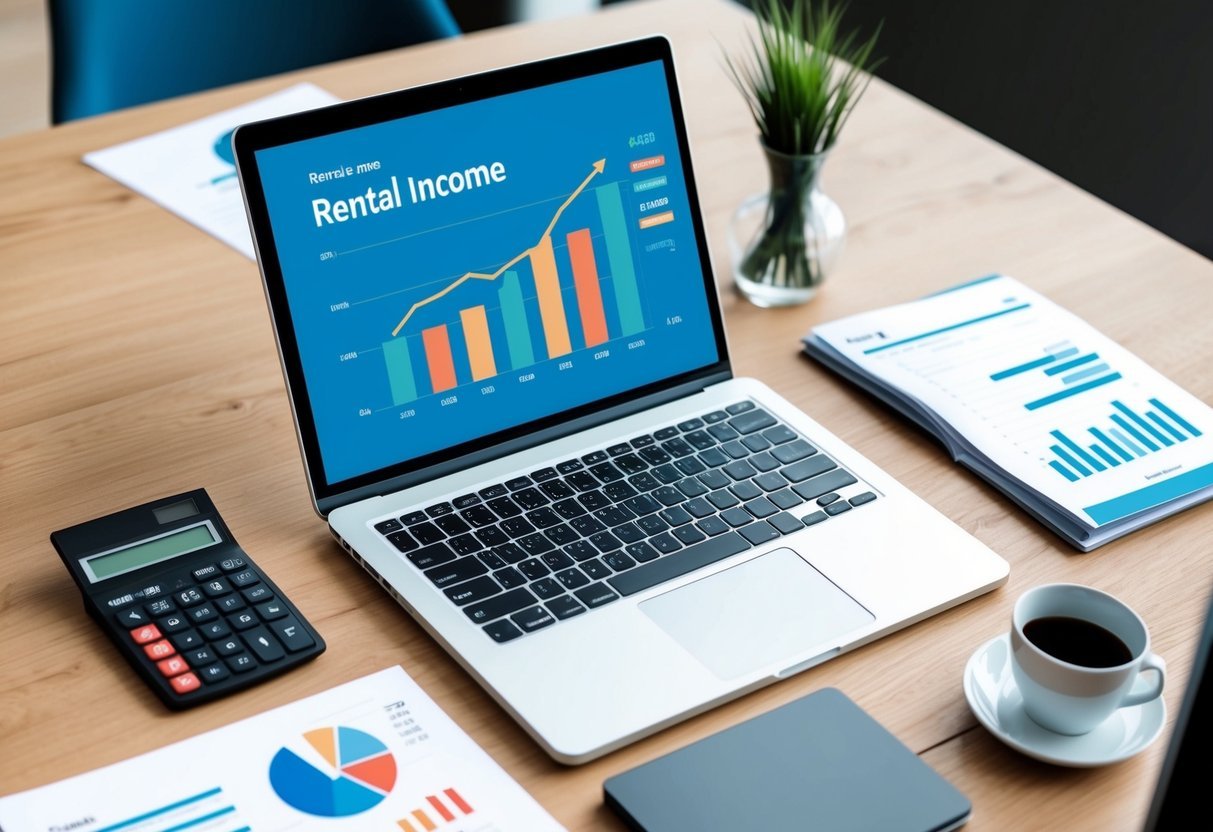
Accurate income tracking is crucial for real estate success.
It provides a clear financial picture, ensures tax compliance, and enables informed investment decisions.
Financial Management
Tracking rental income is essential for effective financial management.
It helps you monitor cash flow and identify trends in your property’s performance.
By keeping detailed records, you can:
• Spot late payments quickly
• Identify seasonal fluctuations
• Forecast future income
This information allows you to make informed decisions about property improvements, rent adjustments, and expansion opportunities.
Proper tracking also helps you budget for expenses and maintain adequate reserves for emergencies.
You can use specialized software to automate rent collection and record-keeping, saving time and reducing errors.
Regular financial reviews based on accurate income data help you optimize your property’s profitability.
Tax Compliance
Accurate rental income tracking is crucial for tax compliance.
The IRS requires you to report all rental income, and proper documentation helps you:
• Avoid audits
• Maximize deductions
• Simplify tax preparation
Rental income and expense worksheets can be invaluable tools for organizing your financial information.
Keep receipts and records for at least three years after filing your taxes.
Consider categorizing income sources separately (e.g., rent, late fees, pet rent) for more detailed reporting.
This level of organization not only ensures compliance but also helps you identify additional revenue streams.
Investment Analysis
Thorough rental income tracking is vital for evaluating your real estate investments.
It allows you to:
• Calculate accurate return on investment (ROI)
• Compare property performance
• Make data-driven decisions
By understanding the actual value and return on your investments, you can identify which properties are performing well and which may need attention.
This information guides future investment strategies and helps you allocate resources effectively.
Use metrics like cash-on-cash return and cap rate to assess property performance.
Regular analysis of your income data enables you to spot opportunities for improvement and make timely adjustments to your investment strategy.
Best Practices for Tracking Rental Income
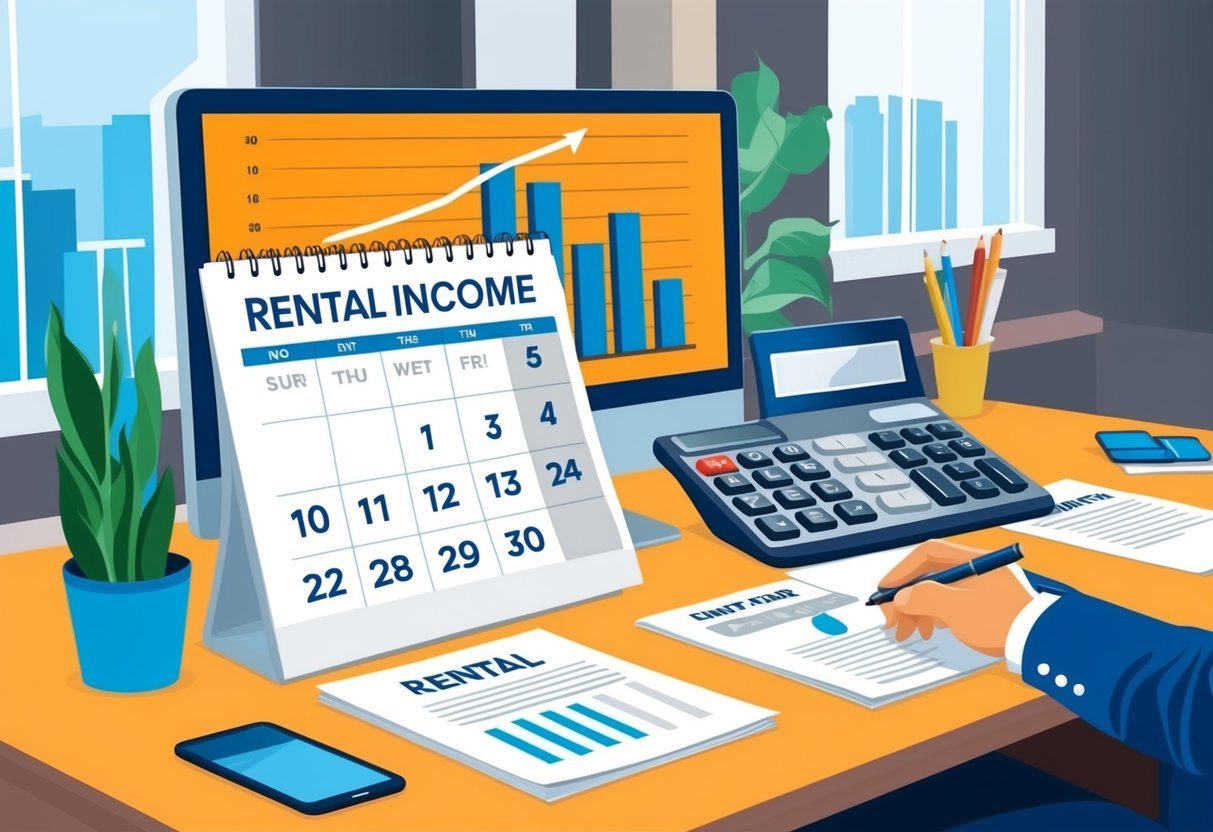
Implementing effective strategies for monitoring your rental income is crucial for successful property management.
These practices will help you maintain accurate financial records and optimize your real estate investments.
Consistent Record-Keeping
Maintain a detailed ledger for each property, recording all incoming rent payments and associated fees.
Use a standardized format to log transaction dates, tenant names, and payment amounts.
Keep digital copies of lease agreements, receipts, and bank statements for easy reference.
Create separate accounts for each rental property to avoid commingling funds.
This separation simplifies tracking and reporting for tax purposes.
Establish a system for handling security deposits, ensuring they’re properly accounted for and refunded when appropriate.
Document all communications with tenants regarding rent collection and financial matters.
Utilizing Automated Tools
Leverage property management software to streamline your income tracking process.
These tools often offer features like:
- Automated rent collection
- Late fee calculations
- Income and expense categorization
- Real-time financial reporting
Consider integrating your banking information with the software for seamless transaction tracking.
Set up alerts for missed payments or upcoming expenses to stay proactive in your financial management.
Explore mobile apps that allow you to record income and expenses on-the-go, ensuring you capture all financial activities promptly.
Regular Financial Reviews
Schedule monthly reviews of your rental income and expenses.
Compare actual figures to your projected budget, identifying any discrepancies or trends.
Analyze your cash flow to ensure your properties are generating the expected returns.
Look for opportunities to increase revenue or reduce costs based on your findings.
Prepare quarterly financial statements to get a broader view of your rental business performance.
Use these reports to make informed decisions about property improvements, rent adjustments, or potential new investments.
Consider consulting with a real estate accountant to ensure you’re maximizing tax benefits and complying with relevant regulations.
Frequently Asked Questions
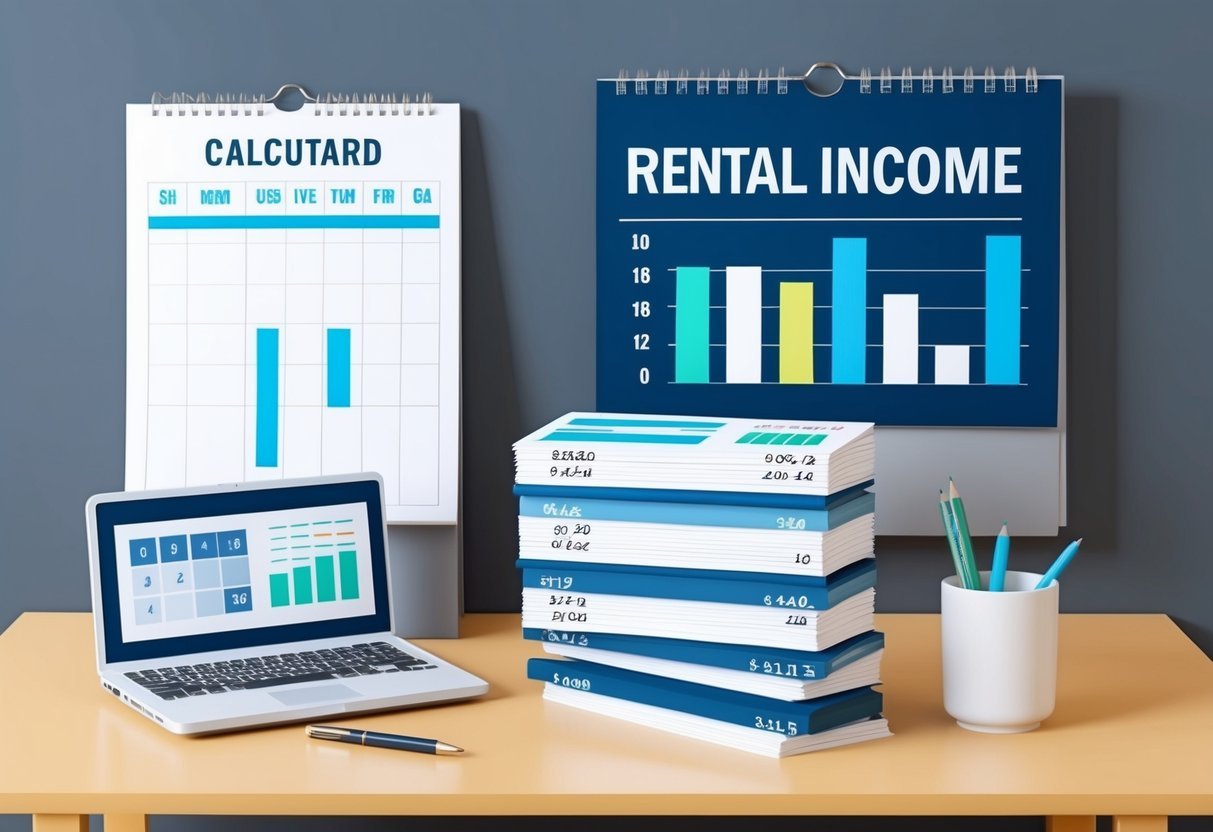
Effective rental income tracking requires the right tools and methods.
Understanding key aspects of accounting, performance monitoring, and tax compliance is crucial for landlords.
What software solutions are commonly used by small landlords for rental property accounting?
Small landlords often use specialized property management software for rental accounting.
Popular options include Stessa, Realtyzam, and Rentec Direct.
These platforms offer features tailored to rental property needs, such as income and expense tracking, tenant management, and financial reporting.
Are there any free accounting software options available specifically for rental properties?
While many robust solutions come with a cost, some free options exist.
Spreadsheet tools like Google Sheets or Excel can be customized for basic rental accounting.
Some property management platforms offer limited free tiers, allowing you to track essential financial data for a small number of properties.
What are the most effective methods for monitoring rental property performance?
To monitor property performance effectively, you should track key metrics regularly.
These include occupancy rates, net operating income, and return on investment.
Utilizing software that provides visual dashboards and automated reports can help you quickly assess property performance and identify areas for improvement.
Which expenses should landlords be diligent in recording for their rental properties?
Landlords should meticulously record all property-related expenses.
This includes mortgage payments, property taxes, insurance, maintenance costs, and utilities (if applicable).
Keeping detailed records of these expenses is crucial for accurate financial reporting and maximizing tax deductions.
How is rental income calculated to ensure accurate financial tracking?
Rental income calculation involves totaling all payments received from tenants, including rent, late fees, and any additional charges.
Accurate tracking requires recording the date of each payment and categorizing different types of income.
Many software solutions automate this process, reducing the risk of errors.
What guidelines does the IRS provide for landlords to keep track of rental income?
The IRS requires landlords to report all rental income on their tax returns.
You should maintain detailed records of rent payments, security deposits, and any other income related to your properties.
The IRS recommends keeping these records for at least three years after filing your tax return.

